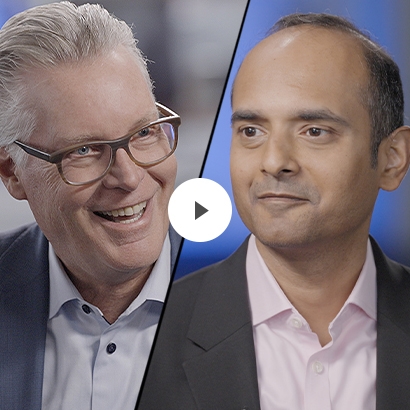A new president’s policy reforms could spur economic growth and the rise of a mass consumer market, with potential opportunities in mobile banking and consumer goods.
This article is authored by Steven Quattry from the Emerging Markets Equity Team. Please find this article on the global Morgan Stanley website here.
Key Takeaways
- With the recent election of a new president, Nigeria could be poised for the emergence of a mass consumer market in one of the fastest-growing populations in the world.
- New policies, including the removal of fuel subsidies and the unification of the naira’s exchange rate, could fuel economic growth.
- Should incomes rise, investors can watch for opportunities in mobile banking, data usage and consumer goods.
Nigeria is perhaps the largest country that investors know the least about. With a young population and a new reform-minded president, Nigeria could be poised for a substantial uptick in economic growth if the administration can deliver on their proposed economic reforms. Here’s what investors should consider in evaluating the opportunity.
Overcoming Challenges
Nigeria is Africa's biggest economy, its largest democracy and home to the sixth-largest population in the world, with 223 million people. Half of the population—a staggering 110 million people—is 17 years old or younger. The population is expected to more than double in the next 50 years to 485 million, adding more people than any other country in the world over that time.1
Yet for the average Nigerian, the last eight years were incredibly difficult. The interventionist policies of former president Muhammadu Buhari—namely, multiple foreign exchange rates and fuel subsidies—led to economic bottlenecks and hindered the private sector's ability to grow. The country was one of the fastest-growing economies in the world from 2001 to 2014, but during Buhari's term grew only 1.4% on average—a poor showing, considering the 2.8% growth in the working-age population.2 Over that same period, the average Nigerian saw their annual income shrink by nearly a third, from $3,222 U.S. dollars to $2,200. By contrast, Kenyans saw their incomes rise by more than 40%3.3
Policy Changes to Spark Growth
Prior to the May 2023 election of new president Bola Tinubu, two sets of policies had inhibited the country’s growth. The first was fuel subsidies, which cost a whopping US$10 billion in 2022 and primarily benefited middle- and high-income members of the population: Only 3% of all subsidiszed fuel was consumed by the poorest 40% of Nigerians.4
The second was a complex currency regime, which led to an overvalued currency and curbed much-needed foreign investment, as foreign direct investment fell by 60% under Buhari.
In response to the economic challenges, Tinubu has acted quickly to revive growth. During his inaugural address, he declared an end to fuel subsidies. Days later, he put an end to the overvalued currency by unifying the exchange rates. The incoming administration intends to grow the economy primarily via private investment and is aiming for 6% real GDP growth per year. This could lead to a strong rise in incomes, which, combined with a young and fast-growing population, could usher in a new consumer class and a number of investment opportunities.
Opportunities in Mobile Banking and Consumer Segments
Two sectors in particular could be areas of interest for investors.
First, the telecommunications sector offers a unique opportunity. Telecom operators have a long runway for growth in mobile data services, as demonstrated by the country’s low mobile data penetration and usage levels: By one estimate, Nigerian internet usage is one-tenth of South Africa’s.5 Additionally, last year’s regulatory changes that allowed telecommunications operators to receive banking licenses have enabled a growing mobile-money market. This presents an opportunity for providers of telecommunications-led mobile-money services, which are still in early stages of growth. Although more than 85% of the adult population has a mobile phone, around 55% have no bank account, and only 10% have a mobile money account.6 Should mobile money penetration levels in Nigeria climb to the 75% to 95% levels seen in Senegal, Ghana and Kenya, it would drastically increase financial inclusion and present an attractive investment opportunity, particularly in telecom operators.
Second, investable opportunities in a number of consumer segments are likely to arise as well. Historically in emerging markets, as GDP per capita has risen to the US$2,000 to US$5,000 range, households have had ample income to cover essential needs, enabling them to gradually afford more discretionary purchases.7 For example, when GDP per capita in China rose from US$1,000 to US$4,000, the demand for automobiles rose at an even greater rate, from one million vehicles to more than 17 million.8 Such a dynamic in Nigeria could help the consumer goods market grow 150% from an estimated US$240 billion in 2023 to about US$603 billion in 2030. This could present investment opportunities in several sectors, including packaged food and beverages, household and personal care products, education, healthcare and even durable goods like appliances and transportation.
The Potential to Export Services
Few countries, including Nigeria, have been able to replicate East Asia’s manufacturing success. However, export of services offers Nigeria untapped opportunities. By some estimates, 125 million Nigerians speak English, which is more than the populations of the UK, Canada and Australia combined. A large pool of English speakers underpins successful service-export industries such as the Philippines’ business process outsourcing sector, which generates more than US$35 billion per year in hard currency, equating to roughly 10% of Nigeria’s expected GDP in 2023.9
The music and film industries offer another potential avenue for service exports. Nigeria is home to two of the most well-known “Afrobeats” artists, in a music genre that has amassed more than 16 billion plays on popular streaming platforms. Meanwhile, the Nigerian film industry, affectionately known as “Nollywood,” produces around 2,500 films per year and is attracting investments from major global media companies. By 2030, Africa’s film and music industries—which are dominated by Nigerian productions—could be worth US$20 billion dollars and create 20 million jobs.10
Looking to the Future
In the next two to three years, once the current administration has succeeded in reversing the harmful policies and economic malaise of the past eight years, Nigeria could witness a sharp upturn in economic growth. This is likely to present investors with opportunities in local equity markets, especially in the telecom, consumer goods and durables sectors. In the long term, the new administration’s challenge will be devising sound policies in education and training to unleash Nigeria’s human capital potential, perhaps its greatest asset. Tinubu and his team of technocrats have a unique opportunity to introduce policies to free up the economy and attract foreign investors looking for sustained growth.



